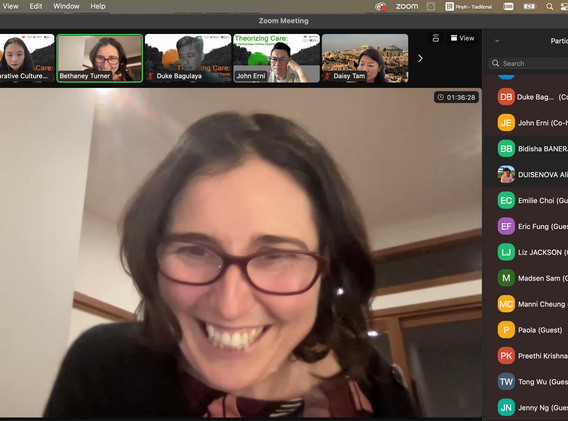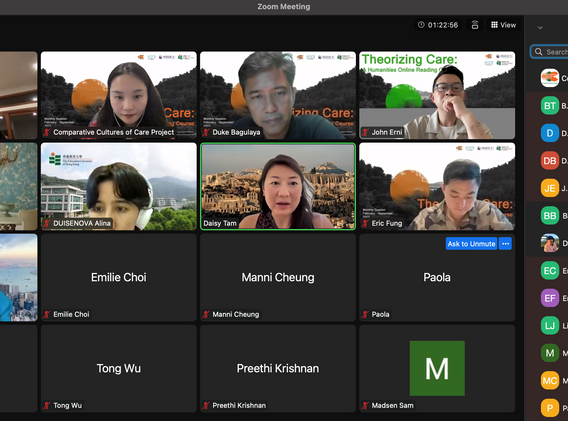
Past Event
Theorizing Care:
A Humanities Online Reading Course
Session Six|13 JULY 2023|4-6pm (HKT)

Session
Leader
Daisy TAM

Dr. Daisy Tam received her Ph.D. in Cultural Studies from Goldsmiths, University of London. Her research in urban food systems and critical cultural analysis on food waste is a theoretical and technical endeavour underpinned by an interest in ethical practices of care. She won the Fulbright Senior Scholar Award and undertook research at MIT in 2018-2019 where she developed Breadline - HK’s first public digital platform for food rescue. She collaborates closely with community organisations and works in an interdisciplinary and impact-driven manner.
Associate Professor
Department of Humanities and Creative Writing
Hong Kong Baptist University
Bethaney Turner

Dr. Turner's research explores the multispecies relationships between people, place and the environment (more-than-human) concentrating on how best to build the resilience and capacity of communities to enact more sustainable futures in a time of climate change. She has particular expertise in local food systems (including community food production, food rescue and food waste management) and understanding the impacts of everyday food interactions on human and planetary health and wellbeing. Conceptions of waste and practices of reuse and repair through community sharing projects are also current areas of focus.
Associate Professor
Centre for Creative & Cultural Research
University of Canberra
Reading
CARE
Session Reading:
1. Turner, B. and Tam, D. (2022) ‘Moving from Risky to Response-able Care’, Antipode. Wiley, 54(3), pp. 914–933. doi: 10.1111/anti.12804.

2. Reich, R. (2013) ‘Philanthropy and Caring for the Needs of Strangers’, Social Research, 80(2), pp. 517–539.

Further Readings:
-
Mol, A. (2008). The Logic of Care: Health and the Problem of Patient Choice. New York and London: Taylor & Francis.

-
Tronto, J. C. (1987). Beyond Gender Difference to A Theory of Care. Signs: Journal of Women in Culture and Society, 12(4), 644-663. https://doi.org/10.1086/494360
Summary
Review
<Response-able Act of Care: Rethinking the Culture of Giving”>
Not all care work is equal within the framework of ethics of care. In this session, both readings deal with the act of giving, along with its often oversimplified relationship with charity. With all the giving done by both individuals and various organizations, every day and everywhere, how can we understand our giving better, so that we could perform it better?
Charitable giving only becomes a tax-subsidized activity in recent decades, compared with the long history of philanthropy. What justifications could there be for the provision of tax incentives for philanthropic giving? In “Philanthropy and Caring for the Need of Strangers”, Bob Reich tries to assess the tax incentives normatively and build a philosophical framework for thinking about the role of philanthropy in democratic societies. In the US., the largest organizational recipient of philanthropy is religious entities, for their facilities, operating costs, and staff salaries. Then education, health, and human services follow. Only a small percentage, one-third, according to a finding by the Indiana University Center for Philanthropy, of all charitable giving goes to the needy. This brings the idea of “Caring for the needs of strangers”[1] to the discussion.
[1] Reich, R. (2013) ‘Philanthropy and Caring for the Needs of Strangers’, Social Research, 80(2), p518
...
-A Summary Review by Eric Feng
Reading & Discussion
Notes
Feel free to write down any questions or comments regarding the reading materials for Session 6 HERE.
Session
Annotation
"Once I received a text message from a volunteer asking if I had networks in Hong Kong's Sham Shui Po area, which is known as an impoverished area of Hong Kong. He'd like to find 10 grassroots kids and take them to a footing street to choose toys and stationery that they like. because these kids have limited resources and might not have the means to buy their own toys, or maybe they only get to play with secondhand. He'd like to give each child a budget of 10 Hong Kong dollars. And then finally the comment is, He'd like to see the smile on the faces of these above-mentioned individuals.
These acts of compassion are very common representations of charity. These acts of charity are taught in schools through stories like the Good Samaritan. Free giving equates to helping. and this kind of performance of benevolence is commonly confounded with narratives of care. As if this is the way to care for the poor as this is the way to care for the environment. Care has to be not a narrative but placed in practice. The problem is the kind of subjectivity, the volunteer expressing himself as someone who is a rational, independent, autonomous individual. unconnected to those he seeks to help and the volunteer is also driven by a sense of morality, that charity is a moral imperative. The giver has to be benevolently giving without receiving anything in return from the receiver. This benevolence assumes a kind of power and balances that the receiver should adopt a sense of gratefulness."
...
Moments
“An ethic grounded in voice and relationships, in the importance of everyone having a voice, being listened to carefully and heard with respect.” -Carol Gilligan, in Ethics of Care🌱🌍
✨🌟This session was a captivating exploration of care in food flow 🍽️ and philanthropy. One of the key takeaways was the examination of “risky care” arising from the acts of compassion, goodwill, and benevolence within the charity work that contain conflicting motivations or processes. Particularly, our session leaders, Dr. Daisy Tam, and Dr. Bethaney Turner, have contextualized these concepts by introducing their frontline food-rescuing work in HK (especially Breadline🥖) and Canberra, and led us to think about “response-able care”🙌. From the fundamental right to food to the discussion of materiality, relationality, and receptivity within the narratives of care, we are compelled to rethink better forms of donor care 🤝.
💖Again, a heartfelt thank you to our amazing session leaders for enriching our understanding of another realm of care.












